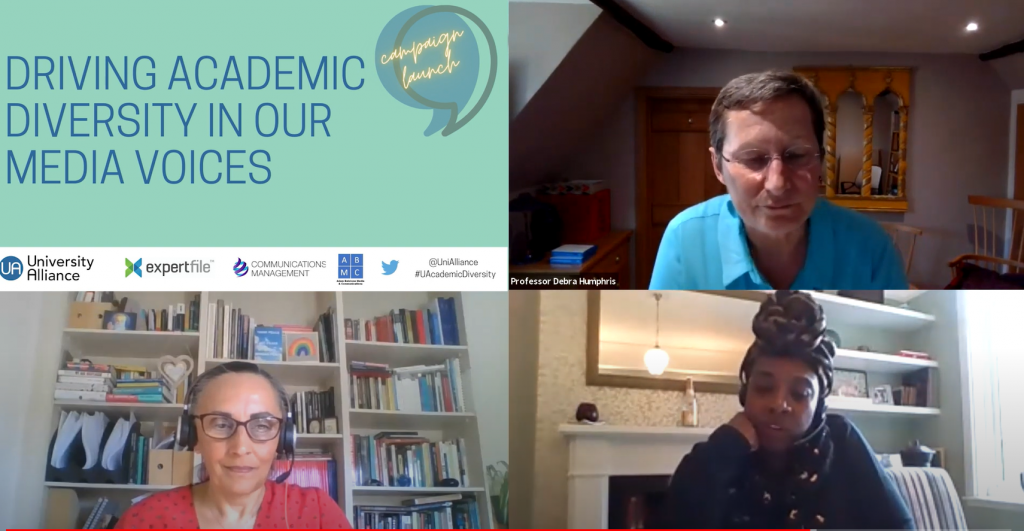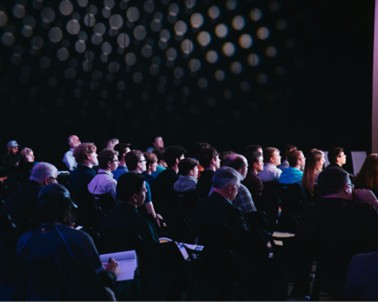Media training, peer-to-peer networks and greater support from universities will all encourage more academics, particularly from diverse backgrounds, to engage with the press, which in turn will ensure a more representative media; according to two experts in media and diversity.
Speaking as part of a panel at the launch of University Alliance’s (UA) new ‘Driving Academic Diversity in our Media Voices’ campaign, Professor Vini Lander and Marverine Duffy shared their reflections on topics including why academics from diverse backgrounds are often reluctant to speak out in the media; advice for academics on engaging with press; and the need for robust support mechanisms to be in place for academics who do take up media opportunities.
University Alliance (UA)’s campaign aims to double the number of academics engaging with the media by 2024, through a programme of work which will offer training, mentoring and profiling for academics.
Previous research undertaken by UA had found that less than a fifth of academic experts within Alliance institutions have had any level of media involvement in recent years, and that this often wasn’t representative of the diversity of the academic community.
Marverine Duffy, Course Director for Journalism and core member of the Sir Lenny Henry Centre for Media Diversity at Birmingham City University, commented on the difficulties many academics, particularly from a diverse background, face when taking up opportunities, “the challenge is as a black, female, senior academic with a heavy workload running 4 courses, I can’t always respond to those requests….workload is a challenge”
“I think your positionality and where you are in your work, whether you’re on contract or not, whether or not the university considers it important for progression to be champion and to be visible, that has an impact on academic’s willingness to be part of [media engagement], but also I think whether or not diverse individuals feel that they’re allowed to flourish in their role- whether or not they’re getting the time, workload allocation.”
Professor Vini Lander – Professor of Race and Education, and Director of the Centre for Race, Education and Decoloniality at Leeds Beckett University – shared her perceptions on how universities can better support academics, particularly those who identify as Black and Global Majority, to engage more with the media.
“It’s about the university, and creating a climate of trust and of safety ….it’s important to make sure that the university has a duty of care, and can help them to deal with any racist abuse that they may gain from greater exposure through engagement with the media.”
Both panellists pointed to the strong culture of support their own university communication teams offered with media engagement; and Vini also highlighted how peer mentoring established by UA could help academics: “the expert bank of media champions could offer a supportive network amongst that community” and that the training being offered for academics would help build confidence in communicating with the media “It’s about turning your research into short digestible phrases – and that’s one of the hardest things that academics have to do.”
Speaking as a journalist now working in higher education, Marverine shared her perception on the importance of academic voices to the media: “…academics, and their work and the research they do, is hugely important for journalists. They are seeking that expert comment and that expert opinion to verify, back up and bolster a news story – and it does make it that bit easier for them to have a bank like [the UA Experts Bank]”.
UA’s campaign hopes to generate greater awareness of the value of research undertaken by Alliance universities, particularly in the media. This starts with broadening the media’s understanding of where experts come from, says Marverine:
“It’s mainly that my journalism students think that ‘we only need to approach scientific researchers from Durham, Oxford, Cambridge’….but we have so many expert people across the Alliance, it’s crazy not to use them.”
Chairing the event, Chair of University Alliance Professor Debra Humphris noted that “we’re on the beginning of a three year journey and we’re all about powering a more diverse academic contribution to the media” and that “this is just the start of a process and an ongoing conversation”.
You can watch the full recording of the event and panel discussion here:
You can view the full discussion here:
For more information about University Alliance’s campaign see the campaign manifesto here: https://www.unialliance.ac.uk/wp-content/uploads/2021/04/Driving-academic-diversity-in-our-media-voices-manifesto.pdf
and the UA ‘Expert Centre’, here https://www.unialliance.ac.uk/experts/




